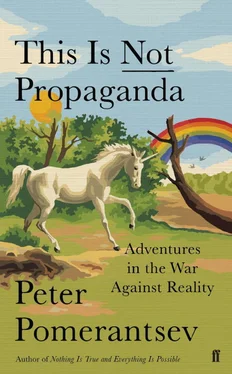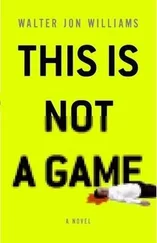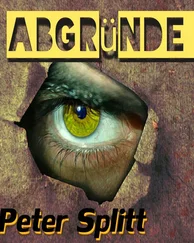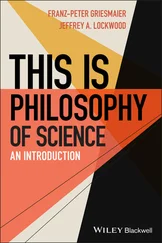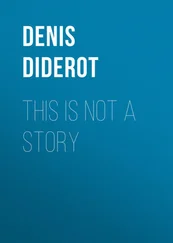As Igor and I were working out what Europe meant, Lina was immersing herself in Russia. She had been the first of our family to return: since 1989 she had been joining documentary crews filming in the USSR and the newly independent states. On her first landing she had the curious sensation that everything she saw was out of synch with what she heard, as if her hearing were straggling behind her sight. She saw the long queues of people all standing far too close to one another, the movements of the taxi driver’s mouth, but would only hear them moments later.
When sound and vision synched, she found herself in a country the stomach of whose society had been ripped out, the intestines of its tragedies and traumas everywhere. Some of her earliest films were about the street children of St Petersburg. There were whole colonies of them, sleeping underground alongside warm gas pipes, living in networks of dark, wet, bare-walled cellars, where they mimicked normal apartments by bringing in settees and watercolour paintings they found in dumps. Many of the children spoke educated Russian but had run away from homes where their parents had become drunk, deranged, as all sense of normality, family, sanity collapsed. All social roles were being overturned. Prostitution, previously taboo, suddenly seemed acceptable. Students would support their parents, answering ads for work as secretaries with ‘no complexes’ – a euphemism for being prepared to sleep with the boss.
The political language was in utter chaos too. In 1994 Lina worked on a documentary about a popular new politician, Vladimir Zhirinovsky, sailing with him on a cruiser down the River Volga as he, dressed in a flamboyant all-white suit, gave speeches to excited crowds gathered along the banks. Zhirinovsky was the head of the Liberal Democrat Party, but he was neither a ‘liberal’ nor a ‘democrat’ in the way the words had previously been used in Russia, when they signified someone tolerant, well spoken, pro-Western. Indeed, it was hard to pin down what he was. His speeches seemed stream-of-consciousness, yet somehow unerringly picked up on the audience’s desires. It was impossible to tell when he was joking and when serious. He promised he would end poverty and homelessness within a few months of coming into power, and that Germany would pay for it as they owed Russia Second World War reparations. He railed against the US with its ‘Mickey Mouse dollars’, which, under his rule, would no longer be able to undercut the glorious Russian ‘golden rouble’; claimed Russia would control the entire territory from the Pacific to the Mediterranean, that Russian soldiers would wash their boots in the Indian Ocean, annex Alaska. But he also told crowds that the reason they lived in penury was Lenin and his Communist economics; that he, Zhirinovsky, would make them like successful Westerners, owning their own homes, new cars and widescreen televisions. He also promised the bands of Cossacks, who stood on the shore with whips, that he would empower them to go and fight against the ‘enemy to the south… We will give you weapons. Take your whips and ramrods, go to the regions where there is anarchy, disruption and anti-state activity and restore order.’
Zhirinovsky meant the breakaway republic of Chechnya, where a year later Russia would be fighting a hapless war with little regard for civilian casualties, and where a new strain of Islamist extremism was beginning to breed. Lina filmed with the Chechen separatists up in the mountains of the Caucasus. They described their struggle as one of national liberation, but Lina also noted something new for Russia: Islamist preachers from the Gulf; women veiling their faces with niqabs.
It was easy in those days for Lina to film everyone from politicians to warlords: just saying you were from the BBC or British television made you a symbol of something better from ‘over there’, an envoy from another world which still had a sense of norms, justice, clear identities, where words stood for something.
Away from her filming Lina went to smoke-filled-to-suffocation performances where the artists and poets of the 1990s tried to make sense of the all-pervasive uncertainty. It was an inspired time. Lev Rubinstein delivered spoken-word performances where he stood with a stack of Soviet library catalogue cards, those little emblems of cultural order, on which he wrote cryptic stanzas, throwing them away as he read through them, a symbol of old meanings falling apart. Dmitry Prigov would howl and chant sound bites of Soviet agitprop until they bent into shamanic dirges. Oleg Kulik discarded language altogether, transforming himself into a growling dog for days, down on all fours and snapping at visitors to his gallery. If words were meaningless, all that was left was action.
‘Soviet time has stopped,’ Zinovy Zinik wrote, ‘while the universe it rules disintegrates.’ [42] The art critic Boris Groys described the moment as the ‘Big Tsimtsum’, a term borrowed from the Jewish mystical tradition of the Kabbalah, an alternative version of Creation where God first brings the world into being and then retreats from it. ‘The withdrawal of Soviet power, or the Tsimtsum of Communism, created the infinite space of signs emptied of sense: the world became devoid of meaning.’ [43]
In 2001, after university, I followed Lina’s trail, moving to Russia to eventually work in television. ‘Moscow’, I would write later, ‘seemed a city living in fast-forward, changing so fast it breaks all sense of reality. Russia had seen so many worlds flick through in such rapid progression – from Communism to perestroika to shock therapy to penury to oligarchy to mafia state to mega-rich – that its new heroes were left with the sense that life is just one glittering masquerade, where every role and any position or belief is mutable.’
Thirty years later, it is not just Russia where signs are ‘emptied of sense’ and the world is ‘devoid of meaning’. The ‘Big Tsimtsum’ feels relevant among the victors of the Cold War too, in countries where professional pollsters struggle to define models for our identities, where what was previously assumed as ‘normal’ has dissolved. Who will be first to form new identities out of the flux?
Othering
As I was experiencing experiments in multilayered identity at the European School, Rashad Ali, also a child of first-generation immigrants, was going through a very different process in Sheffield, Yorkshire.
Back in 1996 Rashad had been immediately impressed by the men from Hizb ut-Tahrir the first time they came to his school to give a talk on Islam. These were the days before 11 September 2001, before ISIS, when no one in the school’s management thought anything bad could come of the well-dressed, erudite young college lecturers in engineering and science speaking so engagingly about big ideas: about whether you could prove God exists, evolution, identity.
‘What kind of Muslim are you?’ they asked the pupils. ‘A Friday Muslim? A part-time Muslim? Can you be a complete Muslim?’
‘Complete’ sounded interesting to Rashad. What could that mean? He went along to the Hizb study groups, held in an ordinary terraced house, among streets of russet-bricked terraced houses built for workers in the city’s once-mighty steel factories that stretched towards the green-sprouting hills of South Yorkshire.
The recruiters explained that in Bosnia, Muslims had spent hundreds of years integrating with the locals: they drank, they smoked, they fornicated like secular Europeans. And what had happened? They were now being slaughtered by their secular and Christian neighbours, who were armed and supported by Slobodan Milošević’s government in Belgrade. And what about Chechnya, where Russian forces were bombing Muslims mercilessly? What was the West doing to help these Muslims? Nothing. ‘Muslims in Bosnia are your brothers,’ said the recruiters. ‘They are your family, not the secular people around you, not the English.’
Читать дальше
